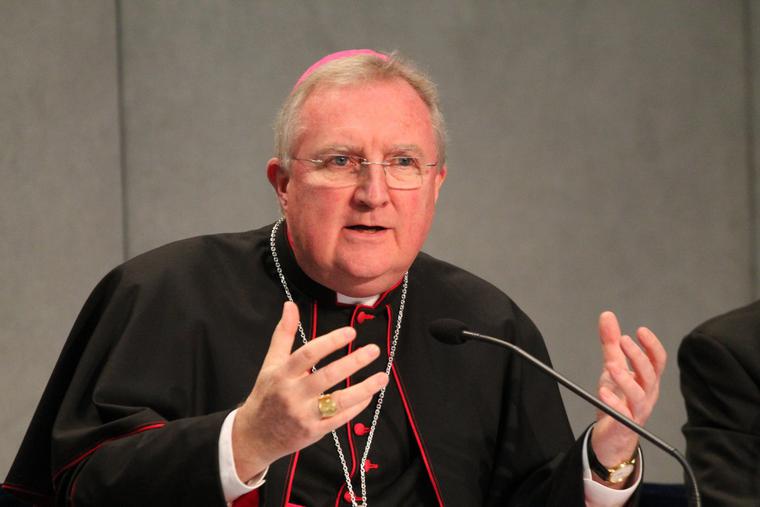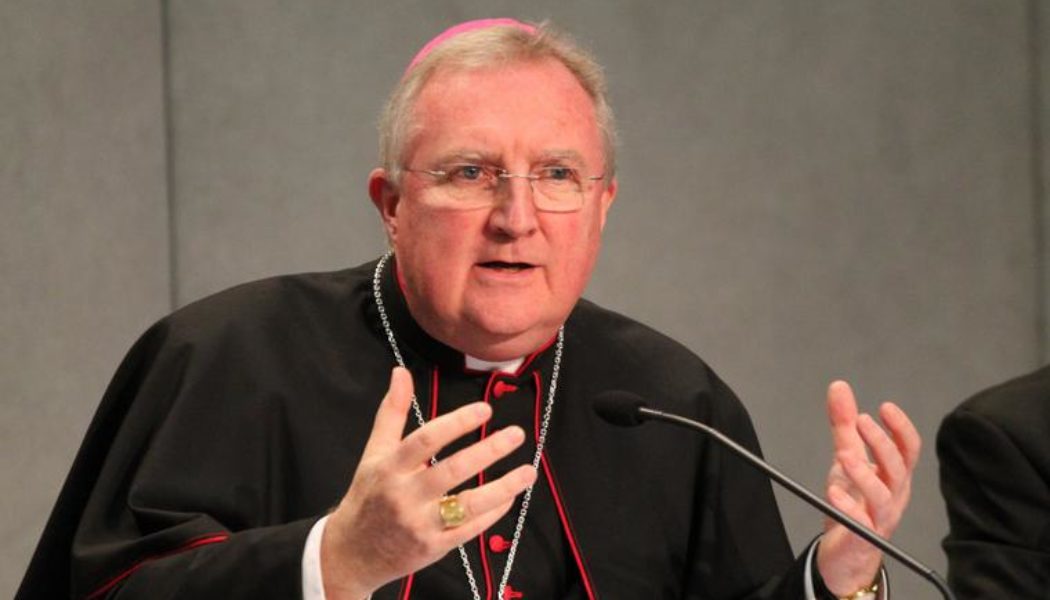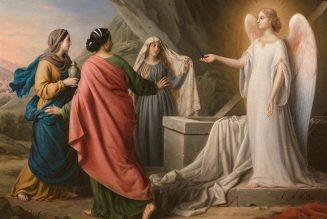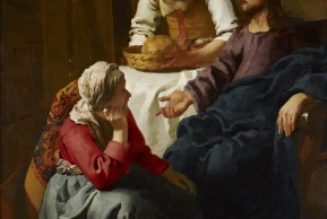
VATICAN CITY — The promotion of the traditional liturgy has been “curtailed but does not characterize discrimination,” Archbishop Arthur Roche has said in Dec. 22 comments to the Register.
“What is important to realize now is that the Holy Father has spoken,” the prefect of the Congregation for Divine Worship and the Discipline of the Sacraments continued. “The liturgical possibilities are in place; the challenge is to get on with it without licking one’s wounds when no one has been injured.”
The archbishop was responding to email questions about Responsa ad dubia — responses to 11 dubia (questions) he issued with the Pope’s approval on applying Pope Francis’ July 16 apostolic letter Traditionis Custodes (Guardians of the Tradition).
That papal document, issued motu proprio (of his own volition), issued sweeping restrictions on the traditional form of the Roman Rite, the liturgy in use before the liturgical reforms that followed the Second Vatican Council, causing considerable dismay among supporters of the extraordinary form of the Mass.
In his responses, Archbishop Roche dismissed accusations that the restrictions have not been carried out in a synodal way, saying synodality means “walking together,” which is “the precise purpose of the motu proprio expressing the direction in which the Church is to walk in its prayer.”
He also answered other questions about the Responsa ad dubia, including whether it applies to traditional institutes, reports that the survey of bishops on which Traditionis Custodes, and now the Responsa, are based, have been falsely interpreted, and why other traditional or alternative forms of the Roman Rite are accepted without such constraints.
Your Excellency, does the Responsa apply to the ex-Ecclesia Dei Institutes, especially with regard to ordinations in the traditional form of the Roman Rite, or are such ordinations permitted to continue in those institutes, as they weren’t specifically mentioned in the Responsa?
First of all, allow me by way of introduction to some of these questions to state an important point. The universal law regarding the antecedent liturgy prior to the reforms of the Second Vatican Council has now been established by the Motu Proprio, Traditionis Custodes of 16 July 2021, which supersedes all previous legislation.
The Responsa ad dubia of 4 December 2021, published by the Congregation of Divine Worship & Discipline of the Sacraments, is an authoritative interpretation of how this law is to be applied. The Congregation for Consecrated Life and Societies of Apostolic Life has competency over the particular Institutes you mention. This Congregation has not made any statement about these Institutes. However, the principle has been established that ordinations in the Latin Church are conferred as directed by the Rite approved by Apostolic Constitution in 1968 [New Rites of Sacred Ordination issued by Pope St. Paul VI].
The second Responsum says that the diocesan bishop is not authorized to grant permission to use Pontificale Romanum. Does this mean that bishops cannot use the Pontificale Romanum, or that they cannot give permission to use it? If the latter, to whom are they not allowed to permit use to?
The Pontificale Romanum of this antecedent liturgy is no longer in use. However, a concession has been made for the use of the Rituale Romanum in the personal parishes, but which excludes the Sacrament of Confirmation, which was replaced by Apostolic Constitution in 1971.
The Responsa have been described by canonists as illicit, as they fail to respect various canons, [i.e. Canon 18: “Laws which establish a penalty, restrict the free exercise of rights, or contain an exception from the law are subject to strict interpretation,” and Canon 87: “A diocesan bishop, whenever he judges that it contributes to their spiritual good, is able to dispense the faithful from universal and particular disciplinary laws issued for his territory or his subjects by the supreme authority of the Church. He is not able to dispense, however, from procedural or penal laws nor from those whose dispensation is specially reserved to the Apostolic See or some other authority…”], the integrity of the traditional rite, and for other juridical reasons. They therefore say the document has no force and can be ignored. What is your response to this?
The responses to the various dubia are evidently legitimate and fully compliant with Canon Law in their elaboration by this Congregation whose authority in this matter is undisputed.
The Responsa prohibits the traditional Mass being advertised in a parish schedule and yet says that it is not marginalizing traditional Catholics. Why was such a measure taken if traditional Catholics are members of the faithful and this initiative is aimed at unity? Does this accentuating of difference not merely heighten divisions, even at a local level?
It is clear in Traditionis Custodes that the celebration of the Mass using the Missale Romanum of 1962 is by way of concession and is therefore not the normal provision of the Church’s liturgy as foreseen by the Second Vatican Council.
The rites as approved by the saintly Popes Paul VI and John Paul II are the unique expression of the Church’s liturgy. As you yourself have noted in one of your own statements most of the adherents to the Missal of 1962 have no problems with the reformed liturgy or the Second Vatican Council but prefer that of 1962, for which reason the celebration of Mass using this Missal is available to them.
However, let me clarify one important matter. The liturgy is never simply a matter of personal tastes or preferences. It is the lex orandi of the Church, which in faithfulness to the tradition received from Apostolic times, is determined by the Church and not by individual members. The Roman Missal of the saintly Popes, Paul VI and John Paul II, is witness to an unaltered faith and uninterrupted and living tradition.
Many traditional Catholics say they have been unfairly discriminated against by Traditionis Custodes and the Responsa ad dubia and left out of consultations. They say these new rules have been unjustly imposed upon them based on a 2020 CDF survey of bishops. However, according to well-sourced reports, contrary to the Holy Father’s explanatory note on Traditionis Custodes, the survey showed that most bishops wished to proceed with a careful and prudent application of Summorum Pontificum. The CDF then sent these findings to the Holy Father in a detailed report. Will the Congregation for Divine Worship therefore be heeding all these factors and concerns in a spirit of synodality and respond to them, as they would were they part of the current universal synodal process? Will the congregation also be working from the actual survey results rather than what these reports say is a false interpretation of them?
The promotion of the antecedent liturgy has been curtailed but does not characterise discrimination. Neither Ecclesia Dei of St John Paul II nor Summorum Pontificum of Pope Benedict XVI foresaw the promotion of these liturgies which, having happened subsequently, became problematic to what the Council, which is the highest form of legislation in the Catholic Church, had decreed.
You will recall what Pope Benedict said to the press on his way to France in 2008 that, “this ‘Motu Proprio‘ (he was talking about Summorum Pontificum which had just been published), is merely an act of tolerance, with a pastoral aim, for those people who were brought up with this liturgy, who love it, are familiar with it and want to live with this liturgy. They form a small group, because this presupposes a schooling in Latin, a training in a certain culture.” Unfortunately, many used the opportunity to take a reverse direction.
As for your point on consultation, the Holy Father has listened very attentively to bishops and, more recently, the Congregation has responded to matters raised by them and various others.
What is important to realize now is that the Holy Father has spoken; the liturgical possibilities are in place; the challenge is to get on with it without licking one’s wounds when no one has been injured. As for your point on synodality, the word means “walking together,” which is the precise purpose of the Motu Proprio expressing the direction in which the Church is to walk in its prayer.
Many traditional faithful have no problems with the reformed liturgy or Vatican II but prefer the traditional form. Why, therefore, can the traditional form of the Roman Rite not be accepted as other differing traditional forms of the Roman Rite are accepted, such as the Ambrosian, Gallican, Dominican or the Anglican (Ordinariate) rites?
With respect, your determination of rites is not entirely accurate. There is only one Roman Rite, just as there is only one Ambrosian Rite and one Mozarabic Rite. The Gallican Rite disappeared many centuries ago, although many of its prayers have been incorporated into various current liturgical books. The others are not rites but usages — adaptations or inculturation of the Roman Rite, which has received approval by the Apostolic See for specific reasons.
Join Our Telegram Group : Salvation & Prosperity








